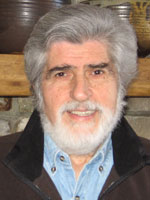Livingston Legacy Award
[See also the page listing Honorary Members of the Livingston Alumni Association, who were named between 1981 and 1999.]
The Livingston Legacy Award was established in 2009. The award recognizes faculty and staff who played a key role in the establishment and growth of Livingston College and its mission, and who have contributed to the overall Rutgers and global communities.
2009 Honorees
| MARIA CANINO | EDWARD G. ORTIZ | GORDON SCHOCHET |
MARIA CANINO: Founder and retired chair of the Rutgers Department of Puerto Rican and Hispanic Caribbean Studies.
EDWARD G. ORTIZ (1931-2010): Retired associate professor; chair of the Rutgers Department of Urban Studies and Community Health. Memorial and obituary.
GORDON SCHOCHET: Professor emeritus of political science and the last member of the Livingston planning group who was still on the active teaching faculty.
2011 Honorees
| JEROME AUMENTE | LEROY HAINES (LC’71) | GERALD POMPER | LARRY RIDLEY |
JEROME AUMENTE (1937-2023): Distinguished Professor Emeritus, Rutgers School of Communication and Information; Founding Director Emeritus, Journalism Resource Institute, Rutgers University; and former Chair, Department of Journalism & Urban Communications program at Livingston College. Aumente on the Livingston College journalism legacy. Remembrance of Aumente.
LEROY HAINES (LC’71): Assistant Dean and Director of Residence Life at Rutgers’ Livingston Campus. Haines honored at 2012 Rutgers Human Dignity Awards.
GERALD POMPER: Board of Governors Professor of Political Science at the Eagleton Institute of Politics of Rutgers University (Emeritus); former Chair, Livingston College Political Science Department.
LARRY RIDLEY: Chairman of Livingston College’s Music Department from 1972-1980, and one of the architects of the college’s renowned jazz program.
2013-2018 Honorees
| ROGER COHEN (RC’65) | W. CAREY McWILLIAMS | MICHAEL GREENBERG | WELLS HAMILTON KEDDIE |
| 2013 Honoree | 2015 Honoree | 2018 Honoree | 2018 Honoree |
ROGER COHEN (RC’65) (1943-2022): A professor emeritus of Rutgers’ School of Communication and Information (SC&I); originally taught in Livingston College’s Department of Journalism and Urban Communication.
WILSON CAREY McWILLIAMS (1933-2005): A distinguished political science professor at Livingston College and Rutgers University, and a prolific author. Read tributes from his protégé, Patrick Deneen, and his daughter, Susan McWilliams, and a remembrance from his student, Leonard Klepner.
MICHAEL GREENBERG: Professor of the Edward J. Bloustein School of Public Policy at Rutgers University-New Brunswick.
WELLS HAMILTON KEDDIE (1925-2006): Professor of Labor Studies and Employment Relations at Rutgers University-New Brunswick.
